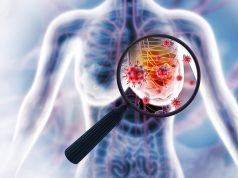Improving biomarkers of glycemic control thought to decrease breast cancer risk
MONDAY, April 20, 2015 (HealthDay News) — Longer nighttime fasting duration is associated with improved glycemic regulation, and in turn, may reduce a woman’s risk for breast cancer by improving biomarkers of glycemic control. The findings were published online April 20 in Cancer Epidemiology, Biomarkers & Prevention to coincide with the annual meeting of the American Association for Cancer Research, held from April 18 to 22 in Philadelphia.
Catharine R. Marinac, from the University of California San Diego in La Jolla, and colleagues examined the correlations of nighttime fasting duration with biomarkers of breast cancer risk. Dietary, anthropometric, and hemoglobin A1c (HbA1c) data were available for 2,212 women, and two-hour postprandial glucose concentrations were available for 1,066 women from the 2009 to 2010 U.S. National Health and Nutrition Examination Survey.
The researchers found that each three-hour increase in nighttime fasting correlated with a 4 percent decrease in two-hour glucose measurement (β 0.96; P < 0.05) and a non-statistically significant reduction in HbA1c. In logistic regression models, each three-hour increase in nighttime fasting duration correlated with a significant reduction in the odds of elevated HbA1c (odds ratio, 0.81; P < 0.05) and with non-significantly reduced odds of elevated two-hour glucose.
“We found that women who fasted for longer periods of time overnight had significantly better control over blood glucose concentrations and these effects were independent of how much they ate,” Marinac said in a statement. “This finding is relevant to cancer research because people who have poor glucose control are more likely to develop certain types of cancer, and it is hypothesized that high concentrations of circulating glucose may fuel cancer growth and progression.”
Copyright © 2015 HealthDay. All rights reserved.








